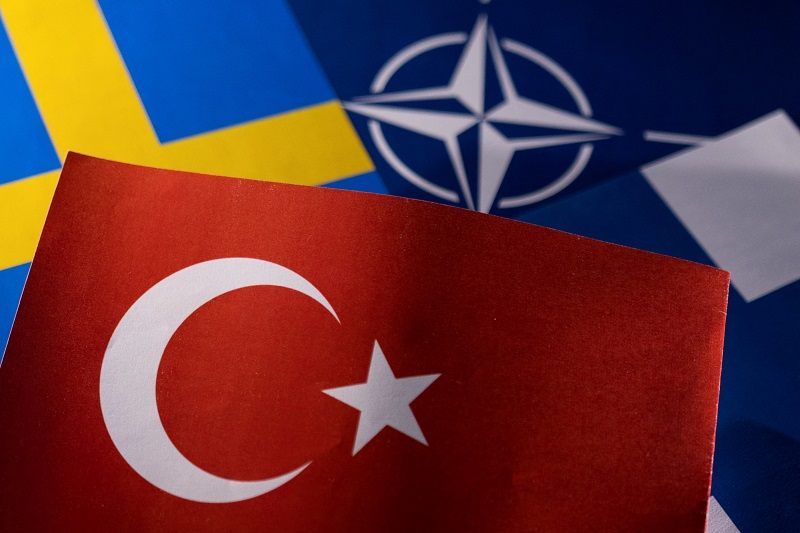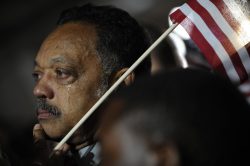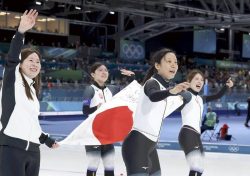
NATO, Turkish, Swedish and Finnish flags are seen in this illustration taken May 18, 2022.
16:41 JST, June 29, 2022
MADRID – Turkey agreed on Tuesday to drop its opposition to the NATO bids of Sweden and Finland, paving the way for the alliance to grow and highlighting how Russia’s war in Ukraine is reshaping the post-Cold War order and reinvigorating transatlantic ties.
As NATO opened a three-day summit in Madrid, those countries’ leaders signed a memorandum confirming that Turkey will support the two Nordic nations’ paths to accession. “Welcoming Finland and Sweden into the alliance will make them safer, NATO stronger and the Euro-Atlantic area more secure,” NATO Secretary General Jens Stoltenberg said at a news conference after the signing ceremony. “This is vital as we face the biggest security crisis in decades.”
The question of how to respond to the crisis triggered by Russia’s full-scale invasion of Ukraine is front of mind for President Joe Biden and other heads of state and government who have gathered this week, first in Germany for a Group of Seven meeting and now in Spain with NATO’s meeting.
The news of Turkey’s turnaround after a month of opposition drew an even greater spotlight to a summit expected to focus on Ukraine’s urgent need for more advanced weapons as its fighters are hammered in the east by Russian forces. The leaders here are also expected to address longer-term strategic questions raised by the Kremlin’s aggression and China’s global ambitions.
The sudden announcement Tuesday evening followed a commitment by G-7 leaders earlier in the day that their countries would “urgently” explore ways to impose price caps on Russian oil and gas to hurt Moscow’s ability to finance the war. But those leaders, meeting at Schloss Elmau in southern Germany’s Bavarian Alps, stopped short of agreeing to new energy sanctions.
The Madrid summit will be closely watched not only for news on weaponry but as a sign of Western resolve for Ukraine, said retired U.S. Army Lt. Gen. Ben Hodges, a former commander of U.S. Army Europe. “The Russians are just so confident that we cannot stay together, that we can’t sustain what we are doing through a long hot summer,” he said.
Allies, he added, intend to send a message to the Kremlin that NATO has “an unmistakable commitment to making sure that Ukraine wins, not just survives.”
The deal with Turkey adds momentum heading into what officials and diplomats call the most significant NATO summit in many, many years.
Sweden and Finland are both close NATO partners who remained officially military nonaligned until Russia’s unprovoked invasion of Ukraine pushed them toward the 30-member military organization. Since they applied last month, Turkey had blocked accession talks over what Ankara said was the two countries’ support for Kurdish militant groups.
Weeks of talks appeared to yield little progress – though NATO leaders and officials remained upbeat. On Tuesday, just as the summit got underway, Biden spoke with Turkish President Recep Tayyip Erdogan. Erdogan then met for several hours with the Finnish president and Swedish prime minister, as well as Stoltenberg. The memorandum signing quickly followed.
“I’m pleased to announce that we now have an agreement that paves the way for Finland and Sweden to join NATO,” Stoltenberg said, noting that the memorandum addressed arms exports and the fight against terrorism.
In addition to discussing military support for Ukraine, summit participants on Wednesday and Thursday will debate plans to bolster NATO’s eastern flank and release a new strategy document laying out the challenge that Russia and China pose, diplomats said.
Stoltenberg announced Monday that the number of high-readiness alliance forces will increase sharply – to more than 300,000 troops from 40,000 – in response to Russia’s war. The expansion is part of what he called the “biggest overhaul of our collective defense and deterrence since the Cold War.”
Biden met with Spanish leaders soon after arriving in Madrid and stressed a similar point. “As I said before the war started,” he told Spanish President Pedro Sánchez, “if Putin attacked Ukraine, the United States would enhance our force posture in Europe and respond to the reality of a new European security environment.”
In Germany, the G-7 agreed to contribute $4.5 billion to address global food insecurity, with more than half the money coming from the United States. As promised on Sunday, the U.S. Treasury Department said it would introduce sanctions on Russian gold, the country’s biggest export outside the energy sector, an action that would be joined by Britain, Japan and Canada. European officials said they need to consult with other members of the European Union before making a similar move.
“We all agree that President Putin cannot win this war,” German Chancellor Olaf Scholz said in his closing remarks Tuesday. “We will keep the political and economic costs for Putin and his regime high and further increase them.”
Scholz said that decisiveness was important in such a challenging, uncertain period. After days of negotiations, the final communique did not include any new energy sanctions but said G-7 countries would instruct ministers to look for ways to impose caps on the price of Russian oil and gas. The goal is to hurt Russia financially and bring down surging energy prices globally.
While Scholz invited “like-minded countries to consider joining us in our actions,” French President Emmanuel Macron said such measures need to be worked through on a technical level before they can be implemented. He called on energy purchasers to better coordinate.
One European official briefed on the talks over price caps said more concrete steps had not been expected, since the G-7 is not a “buyers’ club” and details also would have to be discussed by the E.U. Yet the political backing for the idea sent an important signal, he said, speaking on the condition of anonymity to discuss the private negotiations.
At the moment, some countries that are arming and backing Ukraine in its defense against Russia are simultaneously sending billions of dollars to Moscow in energy payments.
Surging energy prices have blunted the financial impact of countries cutting their imports from Russia. Moscow earned $66.5 billion from fossil fuel exports during the first two months of the war, according to a study published by the Center for Research on Energy and Clean Air, with Germany alone paying more than $9.5 billion.
“We reaffirm our commitment to phase out our dependency on Russian energy,” the final communique read. “In addition, we will explore further measures to prevent Russia from profiting from its war of aggression.”
The oil price cap, which was floated by the United States ahead of the meeting, is complicated by the fact that oil is sold on the open market and Russia could look elsewhere for buyers. Negotiators have been considering ways to enforce the cap though Western-dominated insurance and shipping industries, hoping to leverage them to make it difficult to transport Russian oil that has been purchased outside the cap.
G-7 leaders will consider a ban on services that “enable transportation of Russian seaborne crude oil and petroleum products globally, unless the oil is purchased at or below a price to be agreed in consultation with international partners.”
Russia delivered the biggest increase in supply among OPEC Plus nations in May, and the country produced more oil again in June. The West has grown increasingly alarmed that E.U.’s oil ban on Russian imports would send prices skyward and ultimately benefit the Kremlin.
Analysts at Barclays, the Wall Street firm, estimated in a report last week that oil prices could rise as high as $150 or $200 per barrel if Russian exports are restricted. An official familiar with the negotiations in Germany, who briefed reporters on the condition of anonymity to describe sensitive discussions, said Western allies hoped a price cap would begin with agreement among G-7 nations but then expand to include the E.U. and other key purchasers of Russian energy in Asia.
Still, the idea is a major gamble. Russia could circumvent the effort by taking its oil supply off-market and crashing the world’s energy markets. Treasury Secretary Janet Yellen has said the allies have discussed “secondary sanctions” to punish countries that trade with the sanctioned nation, but those could further destabilize a global economy already facing strong head winds.
A cap on natural gas prices is considered easier to implement because the pipeline infrastructure used to move it means Russia cannot sell gas earmarked for Europe to alternative buyers. On gas, leaders agreed to “seek to develop solutions that meet our objectives of reducing Russian revenues from hydrocarbons,” the text said.
The U.S. Treasury Department also said it would sanction “70 entities, many of which are critical to the Russian Federation’s defense industrial base, including State Corporation Rostec, the cornerstone of Russia’s defense, industrial, technology, and manufacturing sectors, as well as 29 Russian individuals.”
Some observers said Ukraine’s allies are still falling short at a critical time in the war. Ukrainian President Volodymyr Zelensky joined the G-7 summit by video link, with a plea for more modern heavy weaponry that might turn the tide against Russian advances in his country’s east. The same day, a Russian strike hit a crowded market in the central Ukrainian city of Kremenchuk. As of Tuesday, 18 were confirmed dead. Dozens of others were injured in the attack and the blaze that followed.
Rauhala also reported from Brussels. Morris and Noack reported from Mittenwald, Germany, and Viser from Garmisch-Partenkirchen, Germany. The Washington Post’s Jeff Stein in Washington; Ashley Parker in Telfs, Austria; and Florian Neuhof in Berlin contributed to this report.
Top Articles in News Services
-

Prudential Life Expected to Face Inspection over Fraud
-

Hong Kong Ex-Publisher Jimmy Lai’s Sentence Raises International Outcry as China Defends It
-

Japan’s Nikkei Stock Average Touches 58,000 as Yen, Jgbs Rally on Election Fallout (UPDATE 1)
-

Trump Names Former Federal Reserve Governor Warsh as the Next Fed Chair, Replacing Powell
-

Suzuki Overtakes Nissan as Japan’s Third‑Largest Automaker in 2025
JN ACCESS RANKING
-

Japan Institute to Use Domestic Commercial Optical Lattice Clock to Set Japan Standard Time
-

Japan PM Takaichi’s Cabinet Resigns en Masse
-

Israeli Ambassador to Japan Speaks about Japan’s Role in the Reconstruction of Gaza
-

Man Infected with Measles May Have Come in Contact with Many People in Tokyo, Went to Store, Restaurant Around When Symptoms Emerged
-

Prudential Life Insurance Plans to Fully Compensate for Damages Caused by Fraudulent Actions Without Waiting for Third-Party Committee Review
























